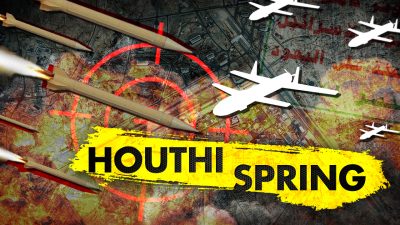The ‘Ukrainian Resistance’ and the Houthis – A Contrast in Media Coverage

All Global Research articles can be read in 51 languages by activating the “Translate Website” drop down menu on the top banner of our home page (Desktop version).
To receive Global Research’s Daily Newsletter (selected articles), click here.
Visit and follow us on Instagram at @globalresearch_crg and Twitter at @crglobalization. Feel free to repost and share widely Global Research articles.
***
In the now month-long mainstream media coverage of the Russian military intervention in Ukraine, much attention has been paid to the actions of the ‘Ukrainian Resistance’.
In a manner not dissimilar to its coverage of the ‘Syrian rebels’ a decade ago, a romanticised image of ‘Ukrainian freedom fighters’ fighting bravely against a militarily superior Russian foe has been widespread amongst corporate outlets, alongside their fawning over Ukrainian President Volodymyr Zelenskyy in his calls for the implementation of a No Fly Zone – a move that would undoubtedly trigger nuclear war.
This Hollywood-style PR makeover of the Ukrainian military by the corporate media, including the notorious neo-Nazi Azov Battalion, also shares a strong similarity with the aforementioned ‘Syrian rebels’ in that it highlights the strong presence of CIA involvement in the background.
Indeed, the training of Ukrainian military personnel by the CIA to engage in guerrilla warfare against Russia was recently outlined in a Western corporate media report, indicating that a plan was in place to draw Moscow into an Iraq-war style military quagmire in Ukraine – the second largest country in Europe.
Such a tactic has historical usage against the Kremlin, when in 1979, then-US President Jimmy Carter would launch Operation Cyclone, a CIA programme which would see the arming, funding and training of Wahhabi insurgents known as the Mujahideen, who would go onto wage war on the USSR-aligned government of the Democratic Republic of Afghanistan – with Kabul, previously Western-friendly, having come under Soviet influence following the 1978 Saur Revolution.
This romanticised image of ‘Ukrainian freedom fighters’ by the corporate media however, lies in stark contrast to their coverage of Ansar Allah, more commonly known as the Houthis, currently waging an armed resistance campaign against Western-allied Saudi Arabia’s seven year long war and blockade on neighbouring Yemen – leading to mass-starvation in what is already the most impoverished country on the Arabian Peninsula.
Indeed, this was evidenced as such on Friday, when the Yemeni armed forces launched air strikes against a key oil refinery in the Saudi city of Jeddah, to a noticeable absence of articles by the Western media celebrating the actions of the Yemeni resistance against the Western-backed might of Riyadh, unlike their coverage of Ukraine and Russia.
To understand this contrasting approach to both Yemen and Ukraine by the corporate media, one must look further into the wider geopolitical and historical context in the West’s relationship with both countries.
In 1979, the same year as the Soviet intervention in Afghanistan, the Islamic Revolution in Iran saw the anti-Western and anti-Zionist Ayatollah Khomeini come to power in Iran following the overthrow of the US and UK-aligned Shah Pahlavi – who had himself come to power following 1953’s Operation Ajax, an MI6 and CIA-orchestrated regime change operation launched in response to then-Prime Minister Mohammad Mossadegh’s decision to nationalise Iran’s vast oil reserves.
In order to counter the influence of Khomeini’s newly-established anti-Imperialist state and to maintain hegemony in the Middle East, the United States adopted the strategy of using Saudi Arabia – separated from the Islamic Republic by the Persian Gulf – as a political and military bulwark against Iran.
This is where the media coverage of the Yemen conflict comes into play, with Tehran long being accused of backing the Houthis, whose seizure of the capital Sana’a in March 2015 led to Riyadh launching its current air campaign – involving US and British-supplied bombs – in a bid to restore its favoured Presidential candidate, Abdrabbuh Mansur Hadi, to power.
Therefore, with the aims of Ansar Allah consequently being opposed to the aims of the US-NATO hegemony, this explains why no heroic descriptions such as ‘Yemeni resistance’ or ‘freedom fighters’ are ascribed to the Houthis by the Western media, in stark contrast to their coverage of the Armed Forces of Ukraine – supported by the West since the 2014 Euromaidan colour revolution and their subsequent war on the breakaway Republics of Donetsk and Luhansk, a situation that has escalated to the point where nuclear war has now become a distinct possibility.
*
Note to readers: Please click the share buttons above or below. Follow us on Instagram, @globalresearch_crg and Twitter at @crglobalization. Feel free to repost and share widely Global Research articles.
Gavin O’Reilly is an activist from Dublin, Ireland, with a strong interest in the effects of British and US Imperialism. Secretary of the Dublin Anti-Internment Committee, a campaign group set up to raise awareness of Irish Republican political prisoners in British and 26 County jails. His work has previously appeared on American Herald Tribune, The Duran, Al-Masdar and MintPress News.
He is a regular contributor to Global Research.
Featured image is from South Front

